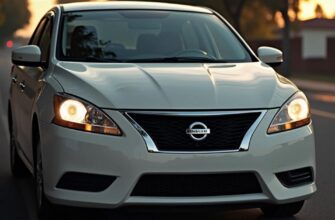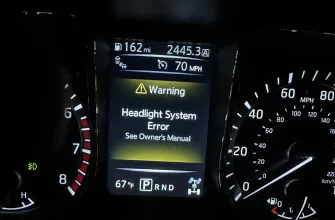That distinct vibration you feel in your Nissan Altima, especially when the engine is humming right around the 2000 RPM mark, can be incredibly unsettling. It’s not just an uncomfortable feeling; it’s your car trying to tell you that something isn’t quite right. Unlike a vibration that changes with road speed (which often points to tires or wheels), a vibration tied specifically to engine RPM usually indicates an issue with components connected to the engine’s rotational speed.
This issue is something that owners of various Altima generations experience, from a 2008 Nissan Altima shaking when accelerating to concerns on newer models like the 2018, 2013, 2015 nissan the specific RPM tie-in is a critical diagnostic clue.
Let’s explore the common reasons why your Nissan Altima might be vibrating at that specific engine speed.
Pinpointing the Problem: Why 2000 RPM?
A vibration that is most noticeable around a particular RPM suggests a component that is resonating, unbalanced, or experiencing a fault at that specific engine frequency. When you’re accelerating, the engine is under load, which can amplify vibrations caused by certain issues. The key systems often involved in RPM-specific vibrations include:
- Engine and Transmission Mounting: These mounts absorb engine and transmission vibrations, preventing them from transferring to the car’s chassis.
- Exhaust System: Components can rattle or vibrate based on engine pulses.
- Engine Performance: Misfires or combustion issues can cause imbalance.
- Drivetrain Components: Parts like the flywheel, flexplate, or even internal transmission components can cause RPM-related vibrations.
Common Causes for Nissan Altima Vibration at 2000 RPM
Here are the most frequent culprits behind that vibration you feel around 2000 RPM in your Nissan Altima:
1. Worn or Damaged Engine/Transmission Mounts
Engine and transmission mounts are designed with rubber or fluid-filled components that absorb vibrations. Over time, these can wear, crack, or break.
- Why it causes vibration: Damaged mounts can no longer effectively isolate the engine’s vibrations from the chassis, leading to shaking felt inside the cabin. This vibration is often more pronounced at specific engine speeds (like 2000 RPM) where harmonics are strongest, or when the engine is under load (like during acceleration).
- Symptoms: Vibration felt through the steering wheel, floor, or seat, often worse during acceleration or when shifting between drive and reverse while stopped. This is a common reason for a 2008 Nissan Altima shaking when accelerating or vibration in newer models.
2. Exhaust System Issues
Problems with the exhaust can cause rattles or vibrations that manifest at specific RPMs.
- Loose Components: Loose hangers, brackets, heat shields, or clamps can vibrate against the chassis or other exhaust parts.
- Internal Catalytic Converter Failure: The ceramic honeycomb inside the catalytic converter can break apart and cause a rattle or vibration at certain engine speeds.
- Exhaust Leaks: While often causing noise, a leak near a manifold can sometimes contribute to perceived vibration.
3. Engine Performance Problems (Misfires)
An engine misfire occurs when the air-fuel mixture in a cylinder doesn’t ignite properly. This creates an imbalance in the engine’s rotation.
- Why it causes vibration: This imbalance leads to a vibration that is directly tied to engine speed. Misfires are often more noticeable under load during acceleration and can cause a vibration around a specific RPM.
- Common Misfire Causes: Worn spark plugs, faulty ignition coils, clogged fuel injectors, vacuum leaks. Misfires usually trigger a Check Engine light.
4. Transmission Issues (Especially the CVT)
Nissan Altimas from the 2013 nissan through the 2018 nissan altima years, and many others, use a Continuously Variable Transmission (CVT). CVTs can be a source of RPM-specific vibration.
- Torque Converter Shudder: A common issue in some CVTs is torque converter shudder, which feels like driving over a rumble strip. This often occurs at specific speeds or RPMs while accelerating or maintaining a steady speed, frequently felt around the 1500-2500 RPM range, making it a likely cause for Nissan.
- Internal CVT Wear: Wear within the CVT belts, pulleys, or other components can also lead to unusual vibrations.
- Transmission Mounts: As mentioned, failing transmission mounts specific to the CVT can also cause vibration.
Discussions on platforms like “Nissan altima vibration at 2000 rpm reddit” often highlight CVT-related shudder as a frequent problem for owners of models like the 2015, 2016, 2017 Nissan Altima.
5. Drivetrain Components (Less Common for Strictly 2000 RPM)
While issues like unbalanced drive shafts, worn CV joints, or axle problems usually cause vibrations that change with vehicle speed rather than strictly engine RPM, in some cases, they can contribute to or interact with RPM-related vibrations, especially under acceleration.
6. Flywheel or Flexplate Issues
The flywheel (manual transmission) or flexplate (automatic transmission) connects the engine to the transmission. If it’s bent or unbalanced, it will cause a vibration directly tied to engine RPM.
Troubleshooting That 2000 RPM Vibration
If your Nissan Altima is vibrating around 2000 RPM, here’s what you can check:
- Note When it Happens: Does the vibration only occur around 2000 RPM? Does it happen in Park or Neutral (more likely engine/mounts) or only when driving and under load (more likely transmission, drivetrain, or engine under stress)? Is it worse during acceleration?
- Check for Warning Lights: Is the Check Engine light on? If so, get the codes read. Misfire codes (P0300-P0304) are a strong indicator of an engine performance issue causing vibration. Other lights, like the Slip Light on your Nissan, could indicate drivetrain issues that might be related, though usually less tied to a specific RPM.
- Visual Inspection (Engine/Transmission Mounts & Exhaust): With the car safely parked and off, visually inspect the rubber components of the engine and transmission mounts. Look for cracks, tears, or excessive sagging. Also, look under the car for any obvious loose or damaged exhaust components or hangers. (Be very cautious working around a hot exhaust).
- Listen Carefully: Can you hear any rattles or buzzing sounds coming from the exhaust system that seem to match the vibration?
When to Seek Professional Help
Diagnosing vibrations can be complex, as multiple systems can cause similar symptoms. If you can’t identify an obvious cause or suspect the issue is related to the engine’s internal performance or the transmission, it’s best to take your Nissan Altima to a qualified mechanic.
- Persistent Vibration: If the vibration around 2000 RPM is consistent and doesn’t go away.
- Check Engine Light: Anytime the Check Engine light is on, professional diagnosis using a scan tool is necessary to read codes and pinpoint the problem.
- Suspected Transmission/CVT Issue: Vibration suspected to be from the transmission, especially the torque converter shudder, requires specialized knowledge and potentially transmission-specific diagnostic tools. Mechanics can perform tests like checking transmission fluid quality (though often a sealed unit), scanning for transmission codes, and evaluating the transmission’s behavior during a test drive.
- Difficulty Isolating Cause: A mechanic can use tools and techniques to help isolate the source of the vibration, such as checking engine mounts by putting the engine under load or using a stethoscope to listen for noises from specific components.
While some car problems might be simple DIY fixes, or involve electronic quirks like Why Does My Nissan Sentra Keep Beeping?, a vibration at a specific RPM often points to mechanical or complex system issues that are best left to professionals for accurate diagnosis and repair. Even seemingly minor sounds, like a whining noise when accelerating in a Ford F-150 (a different vehicle, but highlighting RPM/acceleration related sounds), require careful diagnosis.
“I had a terrible vibration at exactly 2000 RPM in my 2013 Nissan Altima vibration at 2000 rpm. It felt like the whole car was shaking when I accelerated onto the highway. Mike, 58, the mechanic at the dealership said it was a classic case of torque converter shudder in the CVT. They replaced the torque converter, and the vibration was completely gone.” – An Altima owner resolving a CVT issue
Frequently Asked Questions (FAQ)
Q: Why does my Nissan Altima vibrate only around 2000 RPM?
A: A vibration that occurs at a specific RPM, like 2000, is usually caused by a component that is resonating or unbalanced at that particular engine speed, such as engine mounts, exhaust parts, or internal engine/transmission components.
Q: Is vibration at 2000 RPM a common problem for Nissan Altimas?
A: Vibration around this RPM range, particularly under acceleration, can be a known issue in certain generations of the Altima, often linked to worn engine mounts or issues with the CVT, including torque converter shudder. Discussions on forums like “Nissan altima vibration at 2000 rpm reddit” frequently cover this.
Q: Can a misfire cause a 2008 Nissan Altima shaking when accelerating around 2000 RPM?
A: Yes, an engine misfire causes an imbalance in the engine that can lead to shaking or vibration, often more noticeable under load and at specific RPMs.
Q: What should I do if my 2017 nissan altima vibration at 2000 rpm feels like a “rumble strip”?
A: A vibration that feels like driving over a rumble strip, especially during acceleration around 1500-2500 RPM, is a common symptom of torque converter shudder in Nissan’s CVT and should be inspected by a mechanic.
Q: Is the 2015 Nissan Altima vibration when accelerating around 2000 RPM always a serious problem?
A: Not always critical, but it’s a symptom that requires diagnosis. It could be something relatively simple like a worn engine mount or exhaust issue, but it could also indicate a more significant problem with the engine (like a misfire) or the transmission (like CVT shudder). It’s best to have it checked to prevent potential future issues.
Conclusion
A vibration that specifically affects your Nissan Altima around the 2000 RPM mark, particularly during acceleration, is a clear signal to investigate. While causes can range from worn engine mounts or exhaust issues to engine misfires, owners of Altimas from years like 2013, 2015, 2016, 2017, and 2018 should pay close attention to the possibility of a transmission-related vibration, such as torque converter shudder, given the prevalence of the CVT in these models. Paying attention to exactly when the vibration occurs (RPM vs. speed, under load vs. not) is crucial for diagnosis. For a precise diagnosis and effective repair, especially if the vibration is persistent or suspected to be transmission-related, consulting a qualified mechanic is highly recommended to restore your Altima’s smooth ride.







